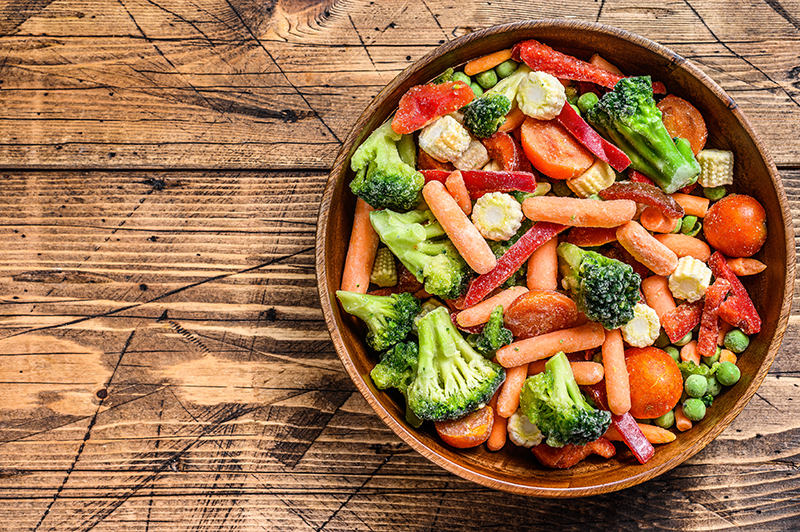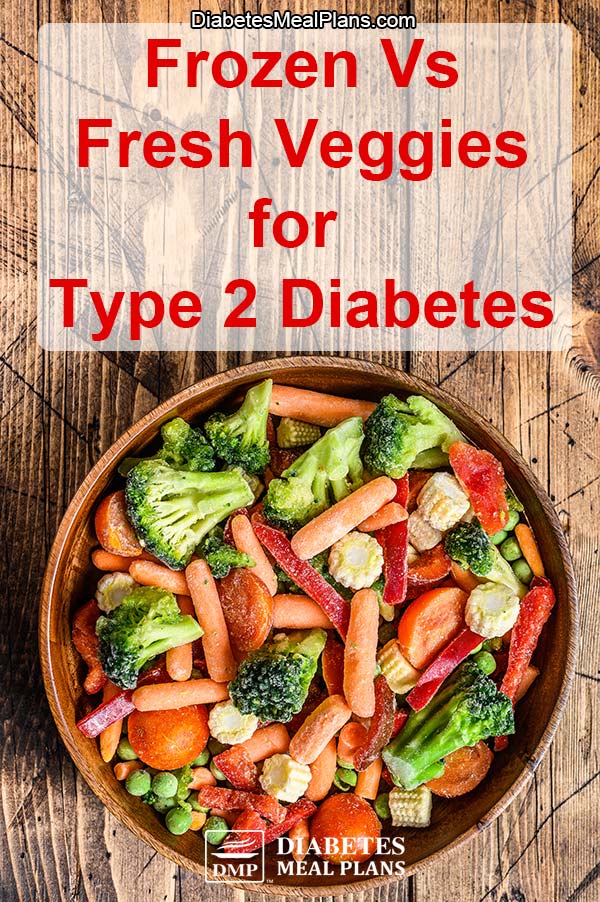Low carb vegetables like broccoli, cauliflower, and leafy greens often make up a large part of a healthy, low carb diet. So when you go to your local grocery store, what do you reach for…that bag of pre-cut broccoli florets in the freezer isle or the head of fresh broccoli in the produce department?
Does it even matter?
Well, let’s take a look at how the nutritional value of frozen vs fresh veggies might differ.

Pros and Cons of Fresh & Frozen Veggies
First, let’s start with the undeniable star of the show…fresh veggies!
Fresh Vegetables
Pros:
- Feel “healthier”: fresh veg tend to feel “fresher” and more “nutritious.” Who can deny a brightly colored and beautifully ripe piece of produce? For many, fresh veggies can be more appealing than frozen ones. (Note: fresh veggies may “feel” more nutritious, but are they really? Keep reading to see what the research says).
- Easiest to cook with: there are more ways to prepare fresh veggies and have them turn out OK, since fresh produce is less likely to get soggy and is more likely to have that satisfying “crunch” that people love!
Cons:
- Short shelf life: depending on the type of produce, fresh veggies can keep for a few days up to a few weeks either in the refrigerator or at room temperature. Veggies will usually be the freshest just a few days after you pick them up from the market. This isn’t a very long window, so be sure to plan your meals ahead of time so all of your veggies get eaten before they go bad.
- Less accessible: if you live in a colder climate or have limited access to large grocery stores, you may have trouble finding decent fresh produce year round.

Frozen Vegetables
Pros:
- Longer shelf life: the shelf life for frozen vegetables is generally 8 to 12 months, but eating them sooner will ensure the best flavor and texture. This allows you to buy in bulk to save money (look out for the specials!) and enjoy your favorite vegetables year round, regardless of what’s in season.
- Super convenient: frozen veggies are usually pre-washed and pre-cut, making them ideal for a quick side dish. When something is easier to make, you’re more likely to actually eat it. Frozen veggies are a great option if you are in a rush and don’t want to spend all your time in the kitchen.
- Minimally processed: like fresh vegetables, frozen veg are also very minimally processed. Most frozen veggies have been harvested at peak ripeness, washed, cut, and then flash-frozen before being packaged and shipped to stores. Technically, this does make them a “processed food” but as long as they don’t have any oils, sugars, sauces, or additives in them (check the ingredient list on the back to make sure), then frozen vegetables are no more “processed” than the fresh veggies in the next isle.
Cons:
- More difficult to cook with: the one major “con” on the side of frozen veg is that, once cooked they may not be as crisp as fresh veggies. Although, the frozen veggies available now seem far better than they used to be.
Fresh vs. Frozen Veggies: Which are Healthier?
Now we’ve come to the question that a lot of people are asking: Which type of vegetable is actually healthier for you? Do fresh vegetables contain more nutrients than frozen?
When we say “nutrients” we are mainly talking about vitamins and phytochemicals (beneficial plant chemicals) that are have antioxidant and anti-inflammatory properties. These vitamins and phytochemicals are the reason you were most likely told to “eat your veggies” as a child. Consuming them often can help you live a longer, healthier life.
So, what does science say about the ongoing battle between fresh and frozen vegetables?
A 2015 study found that frozen vegetables generally retained vitamins like ascorbic acid (vitamin C), alpha-tocopherol (vitamin E), beta-carotene (vitamin A), and riboflavin (vitamin B-2) just as well as fresh vegetables did. Some nutrients were found to be even higher in the frozen vegetables when compared to the fresh ones.
Similarly, another study found that the antioxidant potential of frozen and fresh vegetables was about equal, with some vegetables having more available antioxidants when fresh and others having more when frozen.
This sentiment was echoed in yet another study (2015) that found that the industrial freezing process had no negative impact on the nutritional value of vegetables.
That’s not the only reason to give frozen veggies a fair shot. A 2017 study found that those who utilized frozen produce in their diet actually consumed more vegetables and fruits, had higher nutrient intakes, and were more likely to have a healthy body weight than those who did not eat frozen produce. This shows that frozen veggies may be a more convenient option for some and that you’re more likely to eat your greens if they’re easy to prepare.
Although it’s pretty clear in the research that fresh and frozen veggies are on equal footing in terms of nutrition, there is actually a documented bias against frozen vegetables as seen in a 2018 study! This is probably due to the fact that people just prefer food that feels “fresher”, but this negative press around frozen veggies may also be a result of some negative experiences eating them.
When we look at nutrition comparisons, there are some differences. But as the research shows, perhaps those differences aren’t that great as people consuming frozen veg, still get nutritional benefits.

Conclusion: Is fresh always best?
It all depends on how you like to cook. Nutritionally, fresh and frozen vegetables are similar, so whether you choose one or the other comes down to personal preference, and probably convenience.
We find that a mixture of both frozen and fresh options works for most people (and Harvard agrees with us!). The frozen ones are convenient and the fresh ones can’t be beat in flavor and texture.
At the end of the day, the best vegetable is the kind you will eat and actually enjoy!

Patricia Hiron
This is very interesting and helpful. Thank you for your advice.